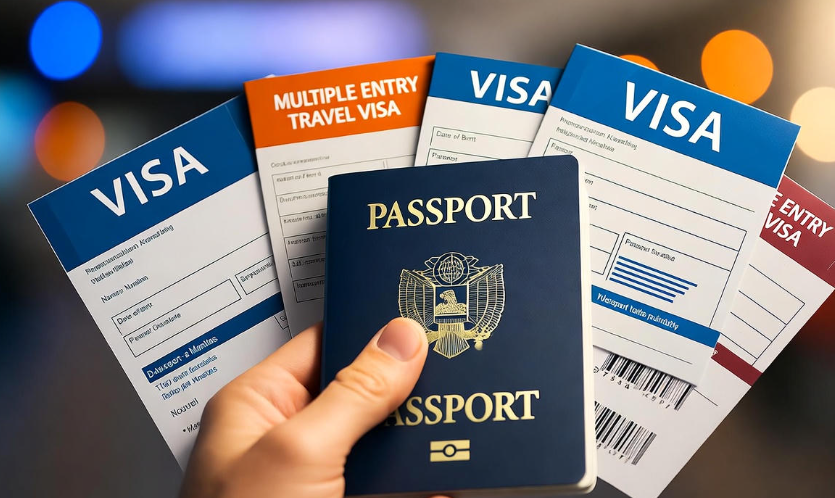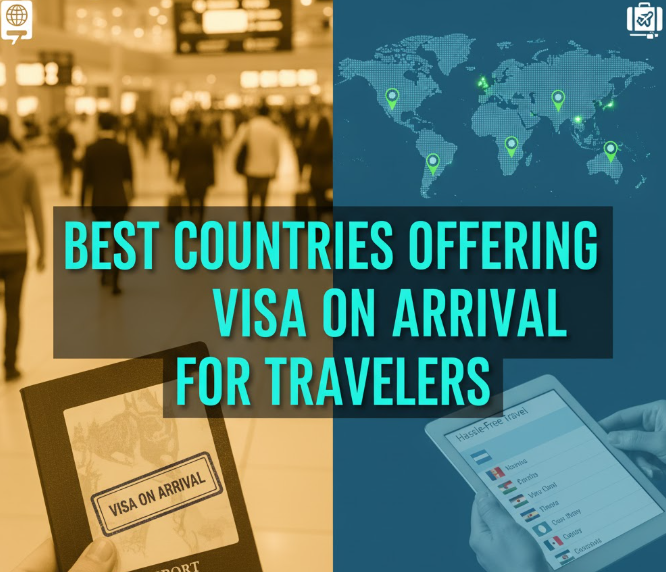If you’ve ever dreamed of working on a beach in Bali, sipping coffee in a café in Lisbon, or coding while watching sunsets in Greece — then 2025 might just be your year. The world is opening up to remote workers like never before. Many countries now offer something called a Digital Nomad Visa, a golden ticket for freelancers, remote employees, and online entrepreneurs to live abroad while working online.
Let’s take a deep look at which countries are offering digital nomad visas in 2025, what makes them special, and how you can apply without hitting unnecessary roadblocks.
What Is A Digital Nomad Visa? ✈️
A digital nomad visa allows remote workers to stay and work legally in another country without needing a traditional work permit. You continue to work for your company or clients abroad while enjoying a new culture and lifestyle. It’s a win-win — you get adventure, and the host country gets your spending power.
Unlike tourist visas, these are designed for longer stays (usually 6 months to 2 years) and often come with easier renewal options.
Why Countries Are Offering Digital Nomad Visas In 2025
Since the pandemic, work has gone remote — and countries realized something big. Digital nomads bring money, talent, and global connections. They rent apartments, eat at local restaurants, pay taxes, and help small businesses grow.
In 2025, many destinations are improving their programs to attract even more remote professionals. The focus is on simplicity, affordability, and lifestyle balance.
Top Countries Offering Digital Nomad Visas In 2025
Here’s a list of some amazing destinations where you can live and work remotely in 2025:
| Country | Visa Duration | Monthly Income Requirement | Application Fee | Best For |
|---|---|---|---|---|
| Portugal | 1 year (renewable) | €3,280 | Around €75 | Great weather, EU access |
| Spain | 1 year (renewable up to 5) | €2,500 | €80–€100 | Sunny lifestyle, tech-friendly |
| Greece | 1 year (extendable) | €3,500 | €75 | Beaches, history, Mediterranean life |
| Croatia | 1 year | €2,500 | €60 | Affordable EU lifestyle |
| Estonia | 1 year | €3,500 | €100 | Tech hub, digital-first country |
| Costa Rica | 1 year (renewable) | $3,000 | $190 | Nature, friendly locals, relaxed life |
| Mexico | Up to 4 years | $2,600 | $50–$100 | Easy visa, rich culture |
| UAE | 1 year | $3,500 | $600 | High-speed internet, tax-free income |
| Thailand | 10 years (SMART Visa) | $2,000 | $300 | Affordable living, rich culture |
| Indonesia (Bali) | 1 year | $2,000 | $50 | Beach life, great community |
| Barbados | 1 year | $4,000 | $2,000 | Caribbean paradise |
| Mauritius | 1 year | $1,500 | Free | Peaceful, tropical island |
| Japan | 6 months | $3,500 | $100 | Tech life + culture |
| South Korea | 1 year | $3,000 | $100 | Modern living, K-culture vibe |
Portugal
Portugal continues to be one of the top picks for digital nomads. With its low cost of living, friendly locals, and sunny weather, it’s hard to go wrong. Cities like Lisbon and Porto are full of coworking spaces, and the internet connection is top-notch.
Applicants need proof of remote income and health insurance. Once approved, you can live in Portugal and explore Europe freely.
Spain
Spain’s digital nomad visa became a game-changer in Europe. It allows you to stay for up to five years with easy renewal. Cities like Barcelona and Valencia offer a perfect blend of work-life balance — great food, friendly people, and sunshine almost all year.
The income requirement is around €2,500 monthly, but the lifestyle makes every euro worth it.
Greece
Imagine working from an island with a view of the Aegean Sea. Greece offers that and more. The visa is valid for a year, and you can renew it. The country’s affordable rent, amazing food, and relaxed pace make it a top choice.
Plus, the Greek government has simplified paperwork to attract more nomads in 2025.
Croatia
Croatia’s visa is popular because it’s affordable, easy to apply for, and lets you live in the EU without paying local taxes on foreign income. The country’s coastal towns — Dubrovnik, Split, and Zadar — are peaceful, beautiful, and filled with remote workers.
You’ll need to show a monthly income of around €2,500 and health insurance coverage.
Costa Rica
If you love nature and tropical weather, Costa Rica is your dream. Their “Stay and Work” visa lets you stay for one year, renewable once. You just need proof of $3,000 monthly income and travel insurance.
The internet is reliable, and locals are warm-hearted. You can work from mountain cabins, rainforests, or beaches.
Mexico
Mexico offers an easy path for digital nomads through its Temporary Resident Visa. It can last up to four years! The cost of living is low, and the food scene is unbeatable.
Places like Playa del Carmen, Tulum, and Mexico City are packed with remote workers. Internet is stable, and coworking cafés are everywhere.
United Arab Emirates (Dubai)
Dubai’s Remote Work Visa lets you live in one of the most modern cities in the world. You’ll enjoy tax-free income, top-tier internet, and global business exposure.
The cost of living is high, but the quality of life, security, and networking opportunities are unmatched.
Thailand
Thailand has launched a long-term visa for remote professionals and freelancers. Bangkok and Chiang Mai are digital nomad hubs with low living costs and excellent food.
The visa can go up to 10 years under certain categories — perfect for those wanting to settle down long-term in Asia.

Indonesia (Bali)
Bali’s digital nomad visa has become legendary. The island offers a calm, creative environment surrounded by nature.
You’ll need to show proof of income and a valid passport, but the lifestyle there — from yoga retreats to beachside offices — is priceless.
Mauritius
This little island in the Indian Ocean offers one of the easiest and cheapest digital nomad visas. No fees, no taxes, just paradise. The only requirement is proof of $1,500 monthly income and travel insurance.
If peace, safety, and sunshine are your priorities, Mauritius is perfect.
Japan and South Korea
Both Japan and South Korea recently jumped into the digital nomad trend. Japan offers up to 6 months, while South Korea allows a year. These countries are ideal for tech lovers and culture explorers who want modern infrastructure with a strong cultural vibe.
Benefits Of Having A Digital Nomad Visa
✅ Legal stay for remote work
✅ Access to banking and rentals
✅ Tax advantages in some countries
✅ Freedom to explore
✅ Extended stay beyond tourist limits
✅ Build global network connections
Common Mistakes To Avoid When Applying
Many applicants face rejection because they miss small but important details. Here’s what to watch out for:
-
Unclear income proof – Always show official bank statements or contracts.
-
Missing health insurance – Most countries require full coverage.
-
Incomplete application forms – Double-check all sections before submission.
-
Late document submission – Respect deadlines; they matter.
-
Not researching visa taxes – Some countries require partial tax payments.
Tips To Get Approved Faster
-
Have your remote income source clearly documented.
-
Keep your criminal record certificate clean and recent.
-
Get travel insurance that includes medical coverage.
-
Translate all non-English documents if needed.
-
Apply online early; processing times vary.
Which Country Is Best For You?
Here’s a quick guide to help you choose based on your preferences:
| Preference | Recommended Country |
|---|---|
| Low Cost of Living | Thailand, Indonesia, Croatia |
| Long Stay Option | Spain, Mexico, Thailand |
| Easy Application | Mauritius, Portugal, Costa Rica |
| Luxury Lifestyle | UAE, Japan, Greece |
| Adventure & Nature | Costa Rica, Bali, Mexico |
Future Of Digital Nomad Visas In 2025 And Beyond
By 2025, digital nomadism has become more than just a lifestyle — it’s an economic movement. Many countries are now tailoring their tax systems, healthcare access, and residency options to attract digital workers.
We can expect shorter approval times, family-friendly visas, and even options to transition into permanent residency in some places like Portugal and Spain.
It’s safe to say: working remotely no longer means staying home.
FAQs About Digital Nomad Visas (2025 Edition)
Q1: Can I bring my family on a digital nomad visa?
Yes! Most countries allow dependents (spouse and children) if you can show sufficient income to support them.
Q2: Do I need to pay taxes in the host country?
Usually, no. As long as your income is from abroad, most digital nomad visas are tax-free. But always check local laws.
Q3: How long does it take to get approved?
Processing time varies — from 2 weeks in Mauritius to up to 3 months in Spain.
Q4: Can freelancers apply too?
Absolutely. Freelancers and self-employed professionals are welcome, as long as they can prove steady remote income.
Q5: Can I switch to permanent residency later?
Yes, in some countries like Portugal, Spain, and Greece, digital nomads can apply for long-term residency after a few years.
Final Thoughts
Working remotely from another country isn’t just a dream anymore — it’s a real opportunity. 2025 is shaping up to be one of the best years yet for digital nomads, with more visa-friendly policies, faster approvals, and incredible global destinations waiting for you.
So, whether you want to wake up to the waves in Bali, walk the cobbled streets of Lisbon, or enjoy sunset tacos in Mexico — the world is open. All you need is your laptop, a good Wi-Fi connection, and the courage to start. ✈️




